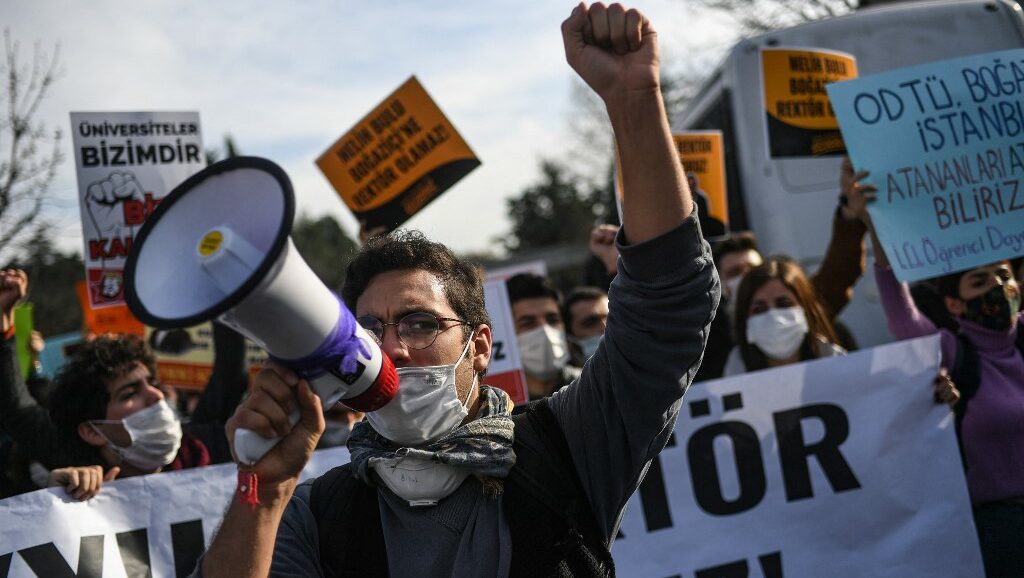Legal experts have slammed the Turkish government’s broad use of the term “terrorist” for individuals and groups critical of its policies and said it put the judiciary under immense political pressure, the Stockholm Center for Freedom reported on Thursday, citing the Deutsche Welle Turkish service.
Amid recent statements from politicians referring to protesting students and everyday citizens as terrorists, experts have said only a court of law could decide if an individual had carried out a terrorist act.
President Recep Tayyip Erdoğan last week referred to a group of students protesting high rent prices as “liars” who were trying to start another Gezi Park protest, after which 80 students were detained.
Lawyer Bilgin Yeşilboğaz, a former member of the Mersin Bar Association, told DW that the government legitimized its targeting of critics by branding them as terrorists. “Terrorism and terrorist have become empty terms,” he said.
Yeşilboğaz added that terrorism was clearly defined in the constitution “as an act of armed violence” aimed at overturning the constitutional order. “However, most individuals accused of terrorism have not carried out armed violence or attempted to overturn the constitutional order,” he said. “As long as the government persists in using the term terrorism in such an arbitrary manner to target critics, they are committing a crime.”
Lawyer Doğan Erkan from the Ankara Bar Association said it was deeply concerning that the government targeted a different group each day. He said all kinds of people could be called terrorists, from women demonstrating for more rights to journalists covering the daily news.
“Even opposition politicians can be called terrorists,” he added. “Anyone who opposes them [the government] is an enemy no matter what the law stipulates. Authorities cannot expect us to get accustomed to this.”
Experts reminded that Erdoğan called people who had foreign currency terrorists back in 2017. At the time, when the Turkish lira had plummeted in value, Erdoğan said that “there’s no difference between people holding on to euros and dollars and people holding on to weapons.”
Erdoğan and his close ally Devlet Bahçeli, leader of the Nationalist Movement Party (MHP), have frequently referred to deputies from the Peoples’ Democratic Party (HDP) as terrorists who are aligned with the outlawed Kurdistan Workers’ Party (PKK).
The Turkish Medical Association (TTB), was accused of terrorism when it objected to the Turkish military’s incursion into northern Syria. In a statement on January 24, 2018, the TTB said wars caused public health problems.
Bahçeli said the TTB was working with the PKK, and Erdoğan said TTB Chair Şebnem Korur Fincancı was a terrorist. Erdoğan also said they would take action to officially remove the word “Turkish” from the TTB’s name.
Several members of TTB were charged with inciting hatred and enmity among the public, and 11 were sentenced to one year, eight months in prison.
Public prosecutors initiated 1.576 million investigations on allegations of terrorism between 2016 and 2020, concluding 208,833 of them. According to lawyers the number of investigations is so high because of the vague definition of terrorism in Turkish law.
The Turkish government has been widely criticized for misusing the vague and imprecise charge of “membership in an armed terrorist organization” to target critics of its policies and to criminalize legitimate activities.
In August 2020 UN rapporteurs sent a joint letter to the Turkish government to underline that Ankara’s anti-terror law (No. 3713) does not comply with its obligations under international law and that the country’s anti-terror legal framework should be urgently revised.
Similarly, the vice chair of the United Nations Working Group on Arbitrary Detention and three special rapporteurs sent a letter to the Turkish government in November 2020 saying that terrorism-related charges appear to be repeatedly misused to target the government’s critics.

